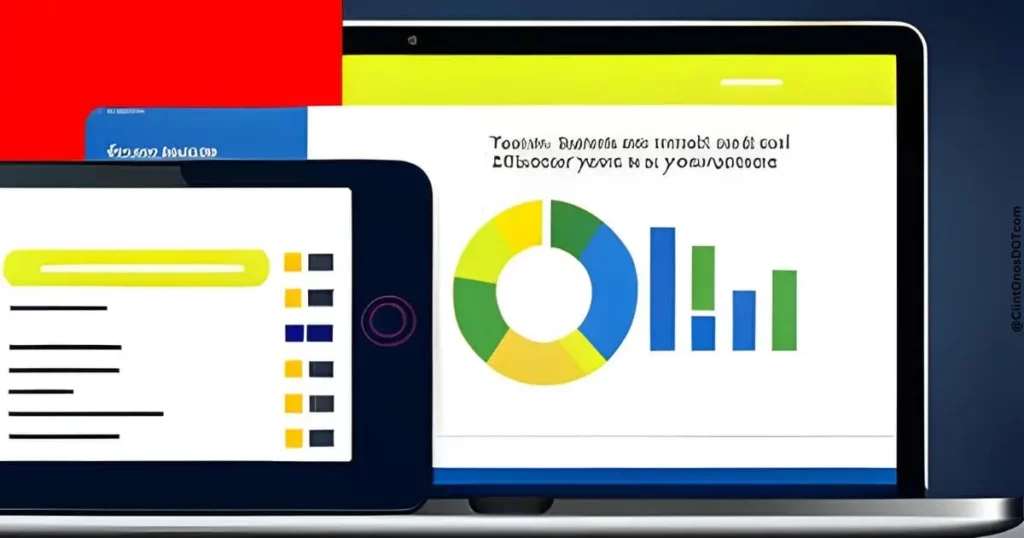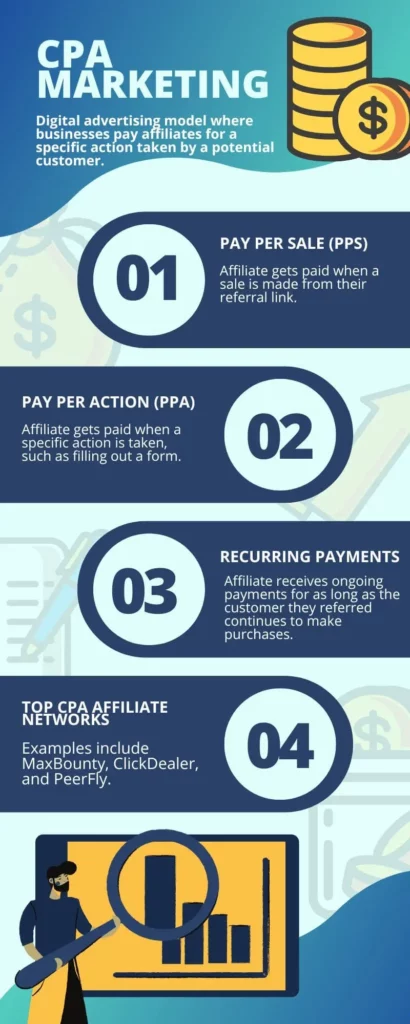If you’re running a business, you’re always looking for effective ways to reach your target audience and promote your products or services.
Digital marketing has opened up new avenues for businesses to advertise and reach customers online. One such marketing tactic is CPA marketing, which has been gaining popularity in recent years.
In this ultimate guide, we’ll cover everything you need to know about this kind of affiliate marketing, including its advantages, categories, model, terminology, best practices, benefits, top affiliate networks, FAQs, and key takeaways. You’re welcome to read our CPA Marketing 101 in-depth insights.

| Key Takeaways |
|---|
| CPA marketing is a performance-based advertising model that pays affiliates for specific actions such as sales, leads, or clicks. |
| CPA marketing has several advantages over other digital marketing tactics, including lower risk, greater control, and better targeting. |
| The CPA marketing model involves three parties: advertisers, affiliates, and CPA networks. |
| There are three categories of CPA marketing: pay per sale, pay per action, and recurring payments. |
| Key terminology and metrics in CPA marketing include affiliate agreement, chargeback, commission, cookies, contextual link, conversion rate, cost per action, and cost per lead. |
| To succeed in CPA marketing, it is important to choose the right CPA network, select the best affiliate for your product, set realistic goals, and continuously optimize your campaigns. |
| CPA marketing can help businesses scale their marketing efforts and reach new customers. |
| Top CPA affiliate networks include MaxBounty, PeerFly, and ShareASale. |
| Key benefits of CPA marketing for advertisers and affiliates include increased revenue, better ROI, and greater flexibility. |
| By following best practices and continuously optimizing your campaign, you can achieve success in CPA marketing. |
What is CPA Marketing?
CPA marketing, or cost per action marketing, is a type of affiliate marketing where advertisers pay affiliates a commission for each specific action that is completed by a visitor or customer, such as filling out a form, signing up for a trial, or making a purchase. Unlike traditional advertising models, where advertisers pay for impressions or clicks, CPA marketing enables advertisers to pay for actual conversions.
CPA marketing can be an effective way for businesses to reach their target audience and drive conversions, as well as for affiliates to earn commissions by promoting products or services. However, success in affiliate marketing requires careful planning, clear guidelines, and ongoing optimization.
We obviously cannot talk about CPA Marketing without exploring the best practices for CPA marketing, including how to provide clear guidelines and requirements, choose the right CPA network, select the best affiliate for your product, set realistic CPA marketing goals, and optimize your campaigns for better performance.
Advantages of CPA Marketing
CPA marketing stands for cost per action marketing, which is a digital advertising model where businesses pay affiliates for a specific action taken by a potential customer, such as a click, form submission, or sale. CPA marketing has several advantages over other digital marketing tactics, including:
- Lower Risks: Advertisers only pay when a specific action is taken by a potential customer, reducing the risk of advertising spend on ineffective campaigns.
- Higher ROI: Advertisers can get higher returns on investment as they only pay for actions that lead to sales or conversions.
- Easy to Track: CPA marketing is easy to track and measure using analytics, allowing advertisers to optimize campaigns for better results.
- Increased Brand Awareness: CPA marketing can increase brand awareness by reaching a larger audience and driving more traffic to your website.
Disadvantages of CPA Marketing
Despite the advantages of CPA marketing discussed above, there are also some disadvantages to consider:
- Limited control over affiliate marketing: CPA marketing involves partnering with affiliates who promote your products or services, but this means that you have limited control over how your brand is represented. If affiliates engage in unethical or spammy marketing tactics, it can harm your brand’s reputation.
- Not suitable for all businesses: CPA marketing may not be the best choice for all businesses. For example, if your product or service has a high price point, the cost per action may be too high for the return on investment to be worthwhile.
- Requires ongoing optimization: To achieve optimal results with affiliate marketing, ongoing optimization is required. This can be time-consuming and requires a data-driven approach to testing and refining campaigns.
- Difficult to find reliable affiliates: Finding reliable affiliates who can effectively promote your products or services can be challenging. It may require significant effort to find and vet potential partners, which can be a barrier to entry for some businesses.

The CPA Marketing Model
CPA marketing involves three parties: the advertiser, the affiliate, and the CPA network.
Advertiser
The advertiser is the company or business that wants to promote its products or services. The advertiser pays the affiliate a commission for every lead or sale generated by their efforts.
Affiliate
An affiliate is a person or business that promotes the advertiser’s products or services through their own marketing channels. Affiliates earn a commission for every action taken by potential customers who click on their unique affiliate link.
CPA Network
A CPA network is a platform that connects advertisers with affiliates. The CPA network helps to manage the relationship between the advertiser and the affiliate, tracks customer actions, and ensures payment to the affiliate.
Cookies
Cookies are used to track customer actions and attribute them to a specific affiliate link. When a customer clicks on an affiliate link, a cookie is placed on their device, allowing the CPA network to track their actions and attribute any actions to the correct affiliate.
Categories of CPA Marketing
There are three main categories of CPA marketing: pay per sale, pay per action, and recurring payments.
Pay Per Sale (PPS)
Pay per sale is a type of CPA marketing where affiliates earn a commission for every sale made through their unique affiliate link.
Pay Per Action (PPA)
Pay per action is a type of CPA marketing where affiliates earn a commission for every specific action taken by a potential customer, such as filling out a form or subscribing to a newsletter.
Recurring Payments
Recurring payments are a type of CPA marketing where affiliates earn a commission for every recurring payment made by a customer. This type of CPA marketing is commonly used for subscription-based services.
CPA Network Terminology
Understanding key terminology and metrics in CPA marketing is essential for measuring the success of your campaigns. Some key terms and metrics include:
Affiliate Agreement

An affiliate agreement is a legal contract between the advertiser and the affiliate that outlines the terms and conditions of their partnership.
Chargeback
A chargeback occurs when a customer disputes a transaction, resulting in a refund to the customer and a loss for the advertiser.
Commission
The commission is the percentage of the sale or action earned by the affiliate.
Cookies
Cookies are small text files placed on a user’s device to track their actions.
Contextual Link
A contextual link is a hyperlink embedded within relevant content that directs users to a specific page or product.
Conversion Rate
The conversion rate is the percentage of users who complete the desired action, such as making a purchase or filling out a form.
Cost per Action (CPA)
Cost per action (CPA) is the amount an advertiser pays for a specific action, such as a sale or lead, generated by an affiliate’s promotion.
Cost per Lead (CPL)
Cost per lead (CPL) is the amount an advertiser pays for a lead, typically defined as a user’s contact information, generated by an affiliate’s promotion.
Earnings per Click (EPC)
Earnings per click (EPC) is the average amount earned per click on an affiliate’s promotion.
Impressions
Impressions are the number of times an advertisement is displayed to users.
Pay per Action (PPA)
Pay per action (PPA) is a model in which advertisers pay affiliates only when a specific action is completed, such as a sale or lead.
Pay per Click (PPC)
Pay per click (PPC) is a model in which advertisers pay affiliates based on the number of clicks generated by their promotion.
Understanding these terms and metrics can help you make informed decisions when creating and optimizing your CPA marketing campaigns. It can also help you measure the success of your campaigns and make adjustments as needed to improve your results.
A contextual link is a hyperlink embedded within relevant text
A contextual link is a type of link that is embedded within relevant text, typically within an article or blog post. These links are typically placed within the body of the content and are meant to provide additional information to the reader on a particular topic. Contextual links are generally considered to be more effective than other types of links, as they are placed within relevant content that is already of interest to the reader.
Benefits of contextual links
There are several benefits to using contextual links in your CPA marketing campaigns:
- Increased relevance: Contextual links are more relevant to the content of the page they are placed on, which means they are more likely to be clicked on by interested readers.
- Improved search engine rankings: Contextual links are considered to be high-quality backlinks by search engines, which can help to improve your website’s search engine rankings.
- Higher click-through rates: Because contextual links are placed within relevant content, they tend to have higher click-through rates than other types of links.
How to use contextual links in CPA marketing
To use contextual links effectively in your CPA marketing campaigns, you should:
- Identify relevant content: Look for blogs, articles, and other online content that is relevant to your CPA offer. You can use tools like Google Alerts or Buzzsumo to find relevant content.
- Contact the website owner: Reach out to the owner of the website and ask if they would be willing to include a contextual link to your CPA offer within their content.
- Provide high-quality content: To increase the chances of the website owner agreeing to include your link, provide high-quality content that adds value to their readers.
- Track your results: Use tools like Google Analytics to track the performance of your contextual links and adjust your approach as needed.
By using contextual links in your CPA marketing campaigns, you can increase the relevance and effectiveness of your marketing efforts, and drive more targeted traffic to your CPA offers.
Recurring payments
Recurring payments, also known as subscription-based payments, are a type of CPA marketing where advertisers pay affiliates a commission for each recurring payment made by the customer. This model is commonly used for online memberships, and software or service subscriptions.
Recurring payments provide a steady stream of revenue for affiliates, and it incentivizes them to maintain customer satisfaction, resulting in a longer customer lifetime value. For advertisers, it allows for predictable revenue, making it easier to forecast future profits.

CPA Marketing Best Practices
When it comes to CPA marketing, following best practices can help ensure the success of your campaigns. Here are some tips to keep in mind:
Provide Clear Guidelines and Requirements
Before partnering with affiliates, it’s important to establish clear guidelines and requirements. This can include guidelines on how your product or service should be promoted, the types of traffic that are acceptable, and any restrictions on keywords or ad copy. By setting clear expectations, you can ensure that your affiliates are representing your brand in the best possible light.
Choose the Right CPA Network
Choosing the right CPA network is crucial for the success of your CPA marketing campaigns. Consider factors such as the network’s reputation, the types of offers available, the payment terms, and the level of support offered. Some of the top CPA networks include MaxBounty, Clickbooth, and PeerFly.
Select the Best Affiliate for Your Product
Not all affiliates are created equal, and it’s important to choose affiliates who are a good fit for your product or service. Look for affiliates with a good reputation in the industry, a strong following on social media, and a proven track record of driving conversions. You can also consider working with influencers who have a strong following in your target market.
Set Realistic CPA Marketing Goals
Setting realistic goals is an important part of any marketing campaign, and CPA marketing is no exception. Determine your target conversion rate, as well as your desired cost per action or cost per lead, and use these metrics to guide your campaigns. Remember that it may take some time to optimize your campaigns and achieve your desired results.
Optimize Your CPA Marketing Campaigns
Optimizing your CPA marketing campaigns is an ongoing process that involves testing and tweaking different elements of your campaigns to improve performance. This can include testing different ad copy, targeting different demographics, and adjusting your bidding strategy. Use data and analytics to guide your decisions, and be willing to pivot your strategy if necessary.
Best Practices:
- Provide Clear Guidelines and Requirements
- Choose the Right CPA Network
- Select the Best Affiliate for Your Product
- Set Realistic CPA Marketing Goals
- Optimize Your CPA Marketing Campaigns
By following these best practices, you can help ensure the success of your CPA marketing campaigns and achieve your desired results.
Benefits of CPA Marketing
CPA marketing offers a number of benefits for both advertisers and affiliates. Here are some of the top benefits:
Benefits for Advertisers
- Cost-effective: CPA marketing allows advertisers to pay only for the desired action, making it a cost-effective marketing strategy.
- Targeted: CPA marketing allows advertisers to target specific demographics, ensuring that their message is reaching the right audience.
- Measurable: With CPA marketing, advertisers can track the success of their campaigns and adjust their strategy accordingly.
- Scalable: CPA marketing can be easily scaled up or down depending on the needs of the business.
Benefits for Affiliates
- Revenue potential: Affiliates can earn a commission for each desired action, providing the opportunity for significant revenue potential.
- Flexibility: Affiliates can choose which offers to promote, giving them flexibility in their marketing strategy.
- Low risk: With CPA marketing, affiliates bear little risk as they only get paid for desired actions.
- Easy to get started: With low barriers to entry, it’s easy for affiliates to get started with CPA marketing.

Top CPA Affiliate Networks
When it comes to choosing a CPA affiliate network, there are many options to choose from. Here are some of the top CPA affiliate networks:
| Network Name | Advantages | Disadvantages |
|---|---|---|
| MaxBounty | High payouts; wide range of offers; user-friendly platform; timely payments | Stricter application process; higher minimum payout threshold |
| PeerFly | Large selection of offers; advanced tracking and reporting tools; quick and easy payouts | Only accepts experienced affiliates; limited support options |
| Clickbooth | High-quality offers; personalized support; on-time payments | Higher payout threshold; limited international offers |
| A4D | Competitive payouts; detailed reporting; strong focus on compliance | Only accepts experienced affiliates; limited verticals |
| CPAlead | Easy-to-use platform; high payouts; weekly payments | Limited offer selection; not suitable for all niches |
| ShareASale | Large network of merchants; easy-to-use platform; reliable payments | Fewer CPA offers; more focused on pay-per-sale |
| Commission Junction | Well-established network with a reputation; large selection of merchants and offers | Steeper learning curve for beginners; high fees for small affiliates |
Choosing the right CPA affiliate network is crucial for the success of your CPA marketing campaign. By weighing the advantages and disadvantages of each network, you can make an informed decision and choose the one that best fits your needs and goals.
The Final Word
In this article, we’ve covered everything you need to know about CPA marketing, from its definition and purpose to the categories of affiliate marketing and best practices for choosing the right CPA network and affiliate. We’ve also discussed the benefits of CPA-marketing and provided a list of the top CPA affiliate networks, along with their advantages and disadvantages.
If you’re considering implementing CPA marketing in your digital marketing strategy, remember to set realistic goals and monitor your campaign’s metrics to measure its success. By following best practices and continuously optimizing your campaign, you can reap the benefits of affiliate marketing and drive more conversions and revenue for your business.
FAQs for CPA Marketing
1. What is CPA marketing?
CPA marketing is a digital marketing strategy in which an advertiser pays a commission to an affiliate for each qualifying action that a customer takes on the advertiser’s website, such as making a purchase or filling out a form.
2. What are the benefits of CPA marketing?
CPA marketing allows advertisers to pay only for actual conversions, making it a cost-effective digital marketing strategy. It also allows businesses to scale their marketing efforts and reach a wider audience through the network of affiliates.
3. How do I choose the right CPA network for my business?
When choosing a CPA network, consider factors such as the network’s reputation, the types of offers available, the level of support provided, and the payout threshold and frequency.
4. What types of offers are available in CPA marketing?
There are three main categories of CPA offers: pay per sale, pay per action, and recurring payments.
5. How do I measure the success of my CPA marketing campaign?
To measure the success of your CPA marketing campaign, track metrics such as conversion rate, cost per action, and cost per lead. It’s also important to set realistic goals and continuously optimize your campaign for better performance.






